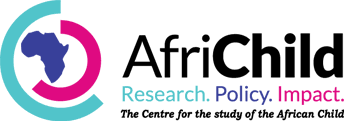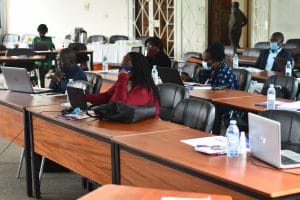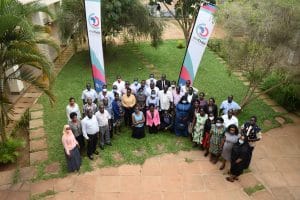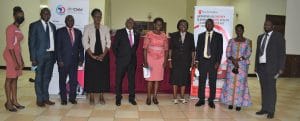It was all color and happiness as Uganda launched its first-ever report on the state of violence against children (VAC). The event happened at Imperial Royale on Thursday 9th August 2018. As various guests trickled in, the Kampiringisa children’s band filled the well-lit and decorated auditorium with sound from various instruments. Mondo Kyateka, the day’s emcee relentlessly treated the dignitaries to biting quotes related to violence against children. Among these dignitaries were: Joyce Wanican, former Executive Director-AfriChild Centre; H.E. Deborah Malac, the US ambassador to Uganda; Noreen Prendville UNICEF’S Deputy Country Director and Hon. Rosemary Sseninde, the Minister of State for Primary Education, Hon. Janat Mukwaya Ministry of Gender Labor and Social Development.
The survey describes the magnitude and nature of physical, sexual and emotional VAC; examines the health consequences of violence; identifies potential risk factors that predispose children to violence and assesses utilization of health services by survivors. Over 5000 respondents aged 13-17 and 18-24 were considered for the study.

The findings are grim. For example, one in three girls in Uganda will be sexually abused before reaching the age of 18 and 85% of child sexual abuse victims know the perpetrator in some way. Sexual violence conforms to different forms such as unwanted sexual touching, attempted forced sex and pressured sex. In regard to physical violence, more than half of Ugandan children experience physical violence between 6 -11 years. Physical violence, in this case, is described as punching, strangling, burning and whipping a child with an object. Disturbingly, over 70% of males and females do not seek health services because they do not think violence is a problem.
“As a ministry, we want to change the status quo of poor health seeking behavior. Therefore, we commit to increasing adolescent health services in the country; train health care workers on child friendly services and provide remedial services to survivors of childhood violence.”
Dr Jesca Nsungwa, the Commissioner for Child Health at the Ministry of Health.
She also said that parents and caregivers should be vigilant to recognize signs of child abuse such as unexplained cuts; fear of adults, nightmares, depression, anti-social behaviors and apathy. In his remarks, Pius Bigirimana, the Permanent Secretary of Ministry of Gender said that the VAC data would be used to plan for interventions that work and that his ministry would take lead. The event comprised of a panel discussion made up of six representatives from government and civil society organizations such as ChildFund-Uganda and TPO-uganda. Lydia Wasula, the Orphans’ and other vulnerable children department coordinator in the Ministry of Gender stressed the need to have a cash grant for vulnerable children in Uganda.
The event ended on a high note with Hon. Janat Mukwaya, Uganda’s minister for Gender, officially launching the report. She urged child-protection players to involve the existing leadership structures at the local level in efforts to reduce violence against children.
“We have youth and local councils in our governance structures whom we can effectively utilize. Let us not leave them to deal with only land matters because they can ably address children’s issues too.” .
Hon Mukwaya
She officially recognized Joyce Wanican, AfriChild’s former Executive Director for the role she played in contributing to the research. AfriChild was the lead institution in data collection for the VAC study. This report follows a call in 2006 by Kofi Annan, the then U.N. Secretary General, for countries to collect data on child abuse in order to inform national policies. Other than Uganda, the other African countries that have released reports on VAC are: Kenya, Malawi, Swaziland, Tanzania and Zimbabwe.






